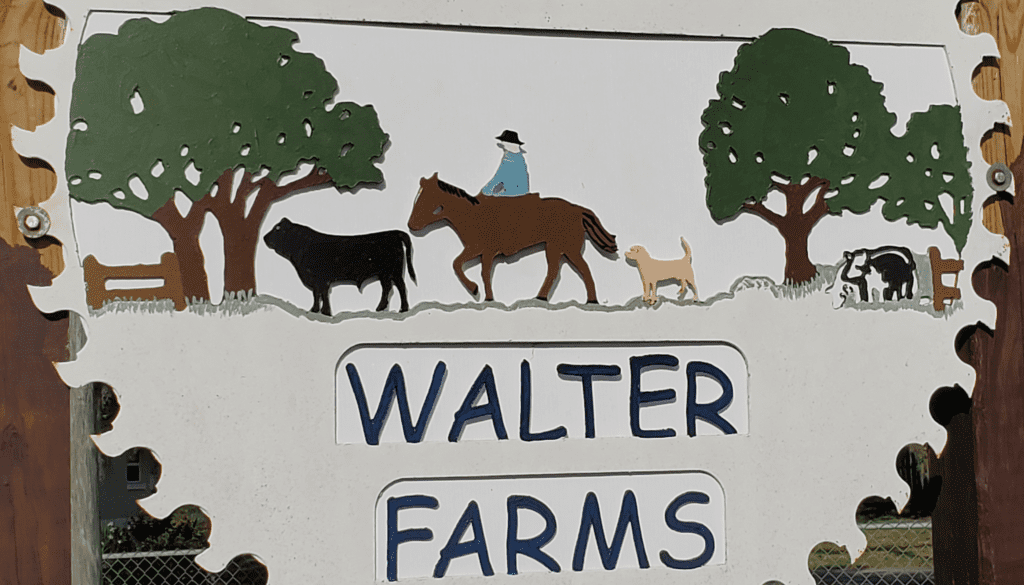From Steer to Blueberries and Citrus, Lausanne Walter’s Family Knows Agriculture
by TERESA SCHIFFER
Lausanne Walter loves the farm life. Her family has been operating a farm in Bartow since 1996. For her, the farming lifestyle is perfect for raising a family.
“All three of my kids have become hard workers who value responsibility,” she says. “It’s peaceful, living in a rural area without a crowd of people around you. It’s very serene.”
The Walter family has agricultural roots, but Lausanne and her family didn’t initially plan to continue the tradition. Lausanne Walter’s husband, Larry, grew up in a farming family in North Carolina. Eventually, he became an engineer and he and Lausanne spent 40 years operating a civil engineering and surveying firm in Kissimmee. The Walters’ three children were heavily involved in the local 4-H organization of Osceola County while they were growing up, which inspired a love of agriculture in the children and their mother.
“Our youngest son, Keith, took to cattle like a duck to water,” Lausanne Walter recollects fondly, “and after each steer he sold every year, he purchased more, until our 15 acres in Kissimmee would not hold his cows any longer.”
The Walters bought some land in Polk County, where they allowed Keith to continue growing his small cattle operation. Today, he runs about 1,400 acres with about 250 cows. Walter Farm produces more than just cattle, though. As the neighboring blueberry farm and citrus grove went up for sale, the Walters jumped at the chance to purchase them and broaden their agricultural interests.
The family-run enterprise now has land dedicated to blueberries, citrus and hay. About 170 acres are devoted to oranges and another estimated 11 acres to blueberries. The farm is managed primarily by Keith Walters, with Lausanne and Larry helping out, along with Lausanne’s brother and sister-in-law.
Lausanne Walter knows the value of agriculture to our state and our society.
“Agriculture is a national security issue across the whole country,” she says. “Most of the major farms of the Midwest have been bought out by foreign investors. If we don’t have local farmers, we’re going to be in trouble.”
Although the pandemic brought to light how imperative it is that we maintain a strong, local food-supply chain, farmers and ranchers still have grave concerns over the future of American agriculture. It is imperative that people get a more complete awareness of how vital the farmers all around us really are, and what kind of challenges they face every day.
“I don’t think the public really understands the work that goes into farming,” Walter says. “The conditions of the weather, the fruit coming in from foreign countries. … Places like Mexico and Honduras have very low labor costs, which makes it hard to compete.” The COOL (Country of Origin Labeling) Act was intended to help inform the public about where their produce is coming from, but unfortunately, its effectiveness has been undermined by unscrupulous merchandisers who exploit a loophole that allows the products to be labeled as United States origin simply for being unwrapped and repackaged on American shores.
Despite these hardships, families such as the Walters continue to persevere, providing fresh, wholesome food to all of us. The blueberries at Walter Farms are coming in quite nicely this year. They grow a wide variety of cultivars, including Arcadia, Emerald, Jewel, Primadonna, and several others.
Anywhere from 40 to 100 H-2A workers will be on hand to help harvest the fruit in the coming days and weeks. As the blueberries are collected and transported, it is important that they be kept at appropriately cool temperatures. Every degree over 70 degrees reduces the shelf life of the berries by a day, so they work diligently to get the berries off the bushes and into refrigeration quickly in order to maximize the output of usable fruit.
The Walter family loves opening their berry fields to the area’s schoolchildren each spring to team them about farming. The kids learn about different aspects of agriculture and get to pick their own blueberries to take home and enjoy with their families. COVID-19 made this beloved annual tradition a little more difficult last year, but the family was able to make it happen nonetheless.
“My favorite part of farming,” Walter says, “is being able to share information with the public, especially children who have never been on a farm before.”

